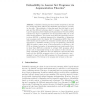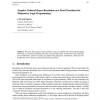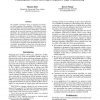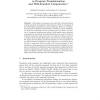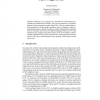128
click to vote
RR
2010
Springer
15 years 14 days ago
2010
Springer
Defeasible reasoning has been studied extensively in the last two decades and many different and dissimilar approaches are currently on the table. This multitude of ideas has made...
108
click to vote
FUIN
2006
15 years 2 months ago
2006
We prove that negative hyper-resolution using any liftable and well-founded ordering refinement is a sound and complete procedure for answering queries in disjunctive logic program...
106
click to vote
AAAI
2006
15 years 3 months ago
2006
We establish a declarative theory of forgetting for disjunctive logic programs. The suitability of this theory is justified by a number of desirable properties. In particular, one...
128
click to vote
LANMR
2007
15 years 3 months ago
2007
Abstract We study the notion of strong equivalence between two disjunctive logic programs under the G3-stable model semantics, also called the P-stable semantics, and we show how s...
130
click to vote
NMELP
1994
15 years 6 months ago
1994
In this paper, we propose a new constructive characterization of those semantics for disjunctive logic programs which are extensions of the well-founded semantics for normal progra...
120
click to vote
LPNMR
2001
Springer
15 years 6 months ago
2001
Springer
Much work has been done on extending the well-founded semantics to general disjunctive logic programs and various approaches have been proposed. However, no consensus has been reac...
150
click to vote
LPNMR
2001
Springer
15 years 6 months ago
2001
Springer
In this paper, we continue to explore many-valued disjunctive logic programs with probabilistic semantics. In particular, we newly introduce the least model state semantics for suc...
116
click to vote
ICLP
2003
Springer
15 years 7 months ago
2003
Springer
Abstract. We extend Clark’s definition of a completed program and the definition of a loop formula due to Lin and Zhao to disjunctive logic programs. Our main result, generaliz...
130
click to vote
ASP
2003
Springer
15 years 7 months ago
2003
Springer
Abstract. Disjunctive logic programs are a powerful tool in knowledge representation and commonsense reasoning. The recent development of an efficient disjunctive logic programmin...
